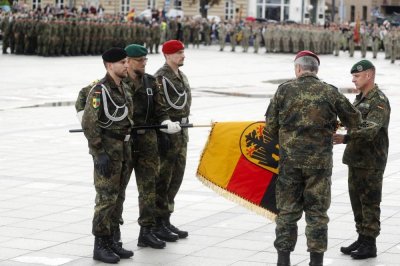
1 of 3 | Germany is deploying soldiers beyond its border, moving troops into Lithuania to defend its European neighbor. Photo by Toms Kalnins/EPA-EFE
May 24 (UPI) — Germany is deploying soldiers beyond its border, moving troops into Lithuania to defend its European neighbor.
Deploying troops to the Lithuanian capital of Vilnius is an indefinite move, German Chancellor Friedrich Merz said on X, accompanied by photos of him greeting soldiers.
“In Lithuania we are taking the defence of NATO’s eastern flank into our own hands: Together, Lithuanians and Germans show that we are ready to defend Europe’s freedom against any aggressor,” Merz said in the post.
“Germany stands by its responsibility. Today. Tomorrow. For as long as it takes.”
The move marks the first time Germany has installed a permanent military presence in another country since World War II.
Merz last month signaled that Germany would send troops to Lithuania on a long-term basis.
The deployment is meant to shore up the North Atlantic Treaty Organization’s eastern flank and to ensure “the security of our Baltic allies is also our security,” Merz said during the event.
German officials expect the 45th Armored Brigade to be at full strength in late 2027. At that point, it is expected to have around 4,800 soldiers and 2,000 vehicles, including tanks and will be headquartered in the Lithuanian city of Rudninkai, near the capital.
Earlier in the month, Merz said Germany planned to build the “strongest conventional army in Europe,” citing a demand from its “friends and partners.”
Lithuania is straddled by allies Belarus to the east and the Russian province of Kaliningrad to the west.
This week, Lithuania accused Belarus of carrying out a massive smuggling scheme and launched legal proceedings against its neighbor at the International Court of Justice in The Hague.
Only a narrow strip of land known as the Suwalki Gap connects Lithuania, Estonia and Latvia to other NATO territories in Europe. The strip straddles the border between Poland and Lithuania and has a small population, making it a potential target for possible Russian military aggression.
In Vilnius this week, Merz mentioned the area while discussing “Russia’s aggressive revisionism” in relation to that country’s ongoing war in Ukraine.